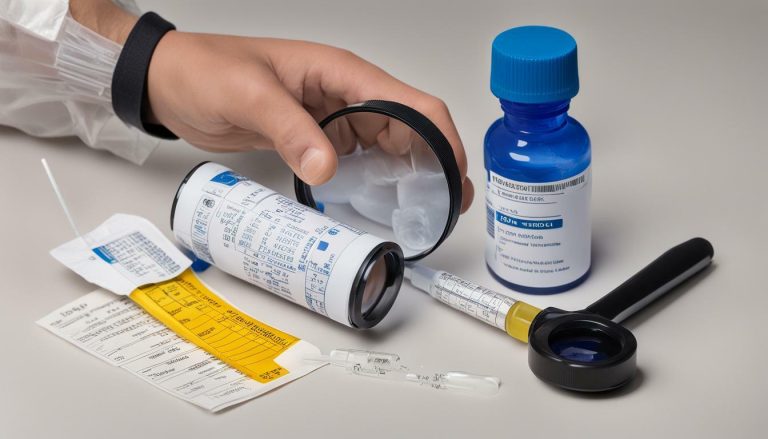Understanding Why Steroids Are Given to Cancer Patients
Steroids are often used as a supportive care measure for cancer patients. They can provide relief from the side effects of cancer treatment and enhance its effectiveness.
So why do they give steroids to cancer patients? Steroids are known to have anti-inflammatory properties, which can help reduce inflammation caused by cancer or its treatment. Additionally, they can help manage nausea and vomiting, increase appetite, and reduce fatigue, thus improving the patient’s quality of life.
There are different types of steroids that are commonly used in cancer treatment. These include dexamethasone, prednisone, and hydrocortisone. The choice of steroid depends on the type of cancer and the patient’s individual needs.
Key Takeaways:
- Steroids are commonly used as supportive care for cancer patients.
- They can help reduce inflammation, manage nausea and vomiting, increase appetite, and reduce fatigue.
- The choice of steroid depends on the type of cancer and the patient’s individual needs.
The Role of Steroids in Cancer Therapy
Cancer treatment can be a taxing experience for patients, and the use of steroids has become an integral part of cancer therapy. Steroids, also known as corticosteroids, are synthetic drugs that mimic the effects of hormones produced by the adrenal gland.
The role of steroids in cancer therapy is to manage the side effects of cancer treatment and enhance the effectiveness of chemotherapy and radiation therapy. Steroids can help reduce inflammation, control nausea and vomiting, and alleviate pain. They can also stimulate the appetite and improve energy levels, which can be especially important in patients experiencing weight loss and fatigue.
Moreover, steroids can enhance the effectiveness of chemotherapy and radiation therapy by making cancer cells more vulnerable to these treatments. This can improve the chances of successful cancer treatment and reduce the risk of cancer recurrence.
However, the use of steroids in cancer therapy can also have side effects. Common side effects include mood changes, fluid retention, increased appetite, and weight gain. Some patients may also experience osteoporosis, high blood pressure, and increased risk of infection. It is important to discuss the potential side effects of steroid treatment with a healthcare provider and monitor their use closely.
The Role of Steroids in Cancer Therapy
In conclusion, the use of steroids has become an important aspect in cancer therapy, helping to manage the side effects of cancer treatment and enhance its effectiveness. However, it is important to weigh the potential benefits against the side effects and risks before using them.
Benefits of Steroids for Cancer Patients
When it comes to cancer management and steroid therapy, steroids can offer a range of benefits to patients. Steroids can help in numerous ways including:
- Reducing inflammation and swelling
- Reducing nausea and vomiting
- Managing cancer-related fatigue and loss of appetite
- Helping to manage cancer-related pain
But how do steroids help cancer patients, exactly? Steroids can help to reduce inflammation, which can be a major factor in cancer-related pain and swelling. They can also help to reduce nausea and vomiting, which are common side effects of chemotherapy and radiation therapy.
In addition to these benefits, steroid treatment for cancer side effects can help to reduce fatigue and improve appetite. This can help to improve a patient’s overall quality of life during cancer treatment.
Steroids in Palliative Care for Cancer Patients
As cancer progresses, patients may experience a range of distressing symptoms, including pain, difficulty breathing, and loss of appetite. Steroids can play an important role in palliative care for cancer patients by alleviating these symptoms and improving quality of life.
Steroids, such as dexamethasone and prednisone, are often used in palliative care to reduce inflammation, swelling, and pain. They can also help increase appetite and reduce nausea, making it easier for patients to eat and maintain their strength.
However, long-term use of steroids in palliative care can also lead to potential side effects, such as weight gain, mood changes, and increased risk of infection. It is important for healthcare providers to carefully weigh the benefits and risks of steroid use in palliative care and monitor patients closely to manage any potential side effects.
In addition to managing symptoms, steroids in palliative care can also allow for more time with loved ones and improve overall quality of life for patients. As with any cancer treatment, it is important for patients and their families to discuss the use of steroids in palliative care with their healthcare provider and consider all available options.
Conclusion
In conclusion, steroids play a critical role in cancer treatment and therapy. They offer numerous benefits to patients, including the management of symptoms associated with cancer treatment and improved quality of life.
Notably, steroids can alleviate pain, inflammation, and nausea, which are common side effects of cancer treatment. They can also enhance the effectiveness of chemotherapy and radiation therapy.
Moreover, in palliative care for cancer patients, steroids can be used to manage symptoms such as pain and difficulty breathing in advanced stages of cancer.
While there are potential side effects associated with long-term steroid use, ongoing research is being conducted to optimize the use of steroids in cancer therapy.
Overall, the use of steroids in cancer treatment and therapy is an essential aspect of modern medicine and has significantly improved the lives of many cancer patients.







